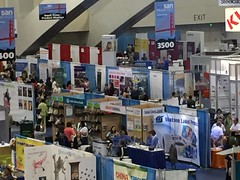 In part 1, I laid out some of the changes that are needed in professional conferences. Now I want us to consider one way that librarians can help improve professional development opportunities for everyone.
In part 1, I laid out some of the changes that are needed in professional conferences. Now I want us to consider one way that librarians can help improve professional development opportunities for everyone.If we decide that in-person conferences are no longer the the correct vehicle for professional development and we want to be more creative, there is one problem that we need to solve - copyright and/or content licensing.
If we move more to an online format for professional development, then we need to ensure that the supportive materials are there too. This is not difficult and some conferences are already posting handouts online. However, it is frequently done without advising the presenters about the rights that they have to their work and how the might protect those rights through a license (e.g., Creative Commons). To me, this is an area where librarians can have an impact on every conference. Librarians - hired by the conference organizers - could work with conferences to understand what rights they want to the presenters' work and for how long. Imagine that handouts, and other materials, are clearly marked with the rights that the participant has to them. And imagine that questions about items in those handouts around use/copyright clearance are answered by someone (a librarian), whose job it is to ensure that the materials are properly using and acknowledging the work of others.
Can an organization actually afford to hire a librarian to do this work? Yes, if the organization is serious about creating new/different professional opportunities, which includes moving face-to-face conferences to the online environment. Is this a full-time position? That I don't know and it might depend on what the organization is doing. If an organization that normally holds a yearly conference of 18,000+ people moves to offering online professional development sessions once a week, including several online conferences per year, that could justify a full-time librarian focused on the copyright and licensing of materials for use in those sessions.
I'd like to see librarians, who are knowledgeable in copyright and licensing, begin to approach conference organizers about ensuring proper licensing of their presenters' materials. Librarians might also consider giving conference sessions geared to the other presenters that focus on copyright and licensing of presentation materials in an online learning environment. This could be the start of us creating new positions for ourselves and for others appreciating our skills even more.
Finally, in talking to a colleague, there is one more innovation to discuss. That is in part 3.
No comments:
Post a Comment